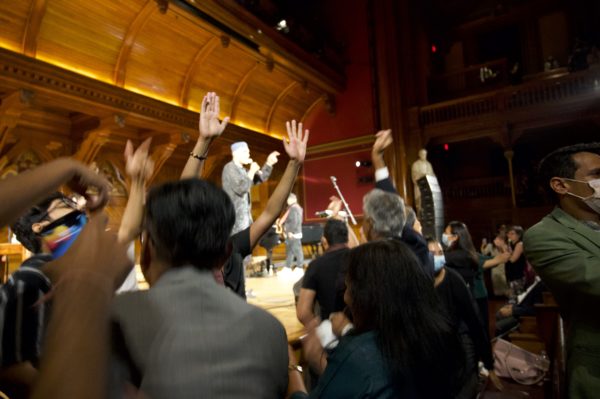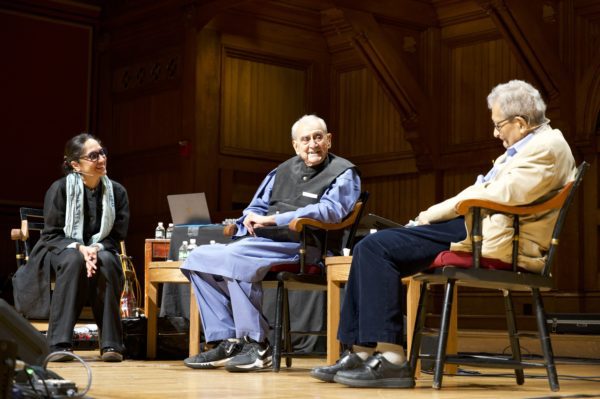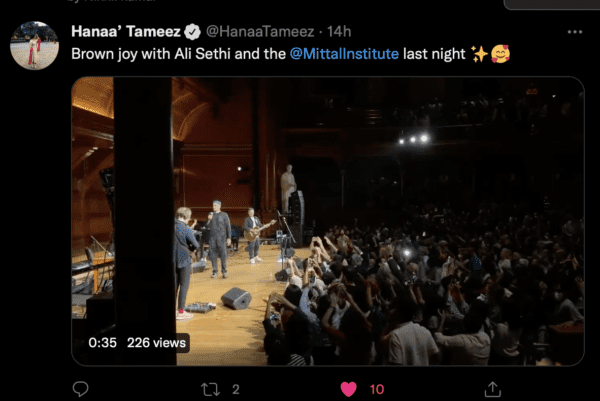
It was a night for the Harvard history books on Wednesday. Faculty, students, alumni and community members from across South Asia and its diaspora—Afghanistan, Bangladesh, India, Pakistan, Sri Lanka—came together in a bring-down-the-house celebration of unity that will not soon be forgotten.
The evening’s festivities commemorated 75 years of independence from British rule—a moment that brought hard-won freedom but widened divisions and created new borders that endure to this day.
But not this week at Sanders Theatre. “Music united South Asia last night,” said Prof. Rahul Mehrotra.
“It brings hope that even as we remain separate nations, we can remember and rekindle the love and camaraderie that exists between us all.” – Prof. Asim Khwaja
“It was an absolutely magical night,” said Prof. Asim Khwaja. “It brings hope that even as we remain separate nations, we can remember and rekindle the love and camaraderie that exists between us all.”
The night started with a once-in-a-lifetime conversation between Pakistani philanthropist Syed Babar Ali and Nobel-laureate Amartya Sen—both of whom were born in undivided British India, lived through partition and went on to become giants of civil society. They were joined on stage by Brown University Prof. Leela Gandhi, who probed key moments and themes of the last 75 years, starting with the serious issue of climate change and the recent catastrophic flooding in Pakistan to enduring friendships across borders to the state of women in South Asia today.

Following that memorable conversation, the house lights dimmed and the stage lit up—literally and figuratively. Ali Sethi ’06, a Pakistani-American singer who has become a global sensation, took the stage to a sold-out crowd, bringing the entire theatre to its feet with his hit song, “Pasoori.”
Sethi, a Harvard alum, felt at home at Sanders. He playfully called out his former literature teacher, Mittal Institute’s Hitesh Hathi several times, saying at one point, “Hitesh, remember that term paper I never wrote, this is it.” Sethi is proficient in multiple South Asian literary and musical traditions and is the first Pakistani to be featured in Spotify’s “Viral 50” global chart.
“A song doesn’t require a visa to cross borders.” – Osman Khalid Waheed ’93
“A song doesn’t require a visa to cross borders,” said Harvard alum, Osman Khalid Waheed ’93, who was in the audience and was instrumental in bringing the evening together.
“It was overwhelming, and yet comforting. The three generations of South Asians on the dais showed—in their own very distinct ways—what was and is possible,” said Prof. Satchit Balsari.
Perhaps the most poignant words of the night were spoken by Sethi in between his powerful lyrics: “South Asian power,” he called out into Sanders Theatre. And in that moment with music reverberating from every corner of the theater, with the entire house dancing together, there illuminated, as Sethi put it moments later, a unity bigger than borders, “the un-partitioned heart.”
Click on the above video to watch and follow the Mittal Institute’s Instagram and Twitter pages for more videos and photos from the evening. Please tag @MittalInstitute using the hashtag #unpartitionedheart.

